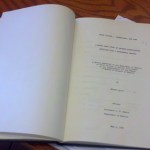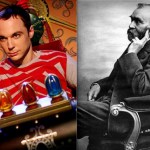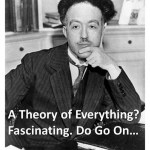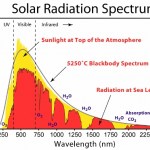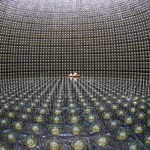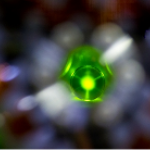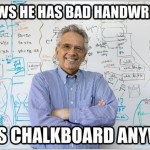Science
John Bohannon of Science magazine has developed a fake science paper generator. He wrote a little, simple program, pushes a button, and gets hundreds of phony papers, each unique with different authors and different molecules and different cancers, in a format that's painfully familiar to anyone who has read any cancer journals recently.
The goal was to create a credible but mundane scientific paper, one with such grave errors that a competent peer reviewer should easily identify it as flawed and unpublishable. Submitting identical papers to hundreds of journals would be asking for trouble.…
No matter how much I try, it seems that I can't escape blogging about Stanislaw Burzynski. Regular readers here are familiar with Dr. Burzynski, the "maverick" cancer doctor (he's not an oncologist) who claims that peptides he's isolated from urine and now synthesizes in his lab and manufacturing facility are highly effective anticancer drugs, so much so that he claims much better results with deadly cancers like glioblastoma than conventional medicine can produce.
There are a number of reasons for my continually being sucked back into the Burzynski orbit, like a spaceship wandering too close…
We cleared a bunch of space in our deep storage area over the summer, and one of the things we found was a box full of old student theses from the 1950's and 1960's. The library already had copies of them, but I thought it was sort of cool to have a look into the past of the department, so we put them up on a shelf in the office. Yesterday, I was glancing over this, and spotted a thin volume, pictured in the "featured image" above, which was a Master's thesis from 1960 (when we used to give MS degrees in physics...) titled "A Monte Carlo Study of Neutron Scintillation Detection with a…
We had a faculty meeting yesterday, at which one colleague suggested that in addition to our "Writing Across the Curriculum" requirement, we should have a "Speaking Across the Curriculum" requirement to teach students oral presentation skills. This provoked a bit of tittering about the possible acronym, but it's not an obviously awful idea. The basic problem is the same as with the WAC requirement: there isn't actually all that much that really crosses the curriculum. Presentation standards and styles are dramatically different between disciplines, whether you're talking about oral or written…
Things have been a bit too serious around here lately. After all, yesterday I wrote about obesity and chemotherapy, while the day before that I did an even lengthier than usual deconstruction of some claims by anti-Obamacare activists, which seemed particularly appropriate to me given that a group of wingnuts has just succeeded in mostly shutting down our government because they are opposed to Obamacare. Come to think of it, given the nastiness that's going on in Washington right now, I could use something light, an easy target even. And who better to serve that role than everyone's favorite…
Last week, before we headed out for the weekend, I had a brief exchange with Ben Lillie on Twitter, prompted by the following set of tweets:
OK, here's a thing. I'll often hear people complain that Hollywood gets science wrong because there's *1* scientist who does everything 1/3
— Ben Lillie (@BenLillie) September 27, 2013
But in reality, science is massively collaborative. So why can't storytellers get that right? 2/3
— Ben Lillie (@BenLillie) September 27, 2013
*BUT* at the same time we have, and wildly celebrate, the Nobel, which embodies exactly that myth. 3/3
— Ben Lillie (@BenLillie…
After a nice, relaxing weekend in Ithaca without the kids, I've returned to a crazy hectic Monday, with no free time to blog, despite a couple of things that I vaguely need to post. Lacking time, though, I'll just give you this image of Condescending Louis de Broglie, an idea that sprang to mind when I ran across the original image and wouldn't go away. This is, obviously, an analogy to the condescending Wonka meme, and derives primarily from the faintly amused look on de Broglie's face in this obviously posed publicity photo from sometime in the 1930's.
A theory of everything? How…
Another year, another fall, another disbursement of dynamite money from our friends in Scandawegia. The 2013 Nobel Prize announcements are almost upon us. Which means it's time for the game everyone loves to tolerate: the Uncertain Principles Nobel Prize Betting Pool. As always, the core rules are simple:
Leave a comment to this post predicting at least one of the winners of one of this year’s Nobel Prizes. If one of your guesses turns out to be correct, you win the highly coveted right to choose the topic of a future blog post.
There's one small modification this year, though, regarding the…
I'm trying to raise money for the The Leukemia & Lymphoma Society, and I promised to do a few things if we reached certain goals. I said I'd write a post explaining what tumor suppressor genes are, while wearing a pirate hat and nothing else, if we raised $5000. Shiver me timbers, I did! And it's cold!
If you want more, go to my Light the Night fundraising page and throw money at it. I'll write about microRNAs and cancer when we hit $7500. Note that we're also getting matching funds from the Todd Stiefel Foundation, so join in, it's a good deal.
There's a basic principle in…
I'm putting together slides for a TED audition talk in a couple of weeks, about how the history of quantum mechanics is like a crossword puzzle. This involves talking about black-body radiation, which is the problem that kicked off QM-- to explain the spectrum of light emitted by hot objects, Max Planck had to resort to a mathematical trick: he assumed that the objects were composed of "oscillators" that emitted light in discrete amounts, with the energy of the emitted light proportional to the frequency of the light. This was a desperation move, and made him a little crazy:
Max Planck…
In a comment to yesterday's post about the liberal arts, Eric Lund makes a good point:
The best argument I have ever heard for doing scholarship in literature and other such fields is that some people find it fun.
I single this out as a good point not because I want to sneer at the literary disciplines, but because with a little re-wording, this could apply to just about anything. The best reason for studying any academic subject is because it's fun.
This is, as I alluded to in a later comment of my own, a significant source of tension for Delbanco's book and a lot of other arguments about…
It's gradually becoming clear to me that this blogging thing is old hat. It's a Web 4.0 world now, and we're all just Tmblng through it. So, I need to get with modernity, and start posting the listicles that are the bread and butter of the new social media order. Thus, I give you a web-friendly list of The 15 Most Interesting Force-Carrying Bosons.
The 15 Most Interesting Force-Carrying Bosons
1) The Photon
CGI photon from Physics World (http://physicsworld.com/cws/article/news/2012/aug/10/photon-shape-could… )
(Image source: This Physics World article)
The photon is the carrier of the…
The JCC day care is closed today for one of the fall cluster of Jewish holidays, which means I'm spending the morning with The Pip before Kate comes home to take the afternoon shift so I can teach my class. Thus, this is more of a tab clearance sort of exercise than a thoughtful examination of the underlying issues. But having spent a bunch of time in the recent past on gender gaps of various sorts, these are some recent links that struck me as interesting enough to pass along.
-- Via Crooked Timber, Anca Gheaus offers cheers for being the "token" woman at academic conferences. This is mostly…
One of the chapters of the book-in-progress talks about neutrino detection, drawing heavily on a forthcoming book I was sent for blurb/review purposes (about which more later). One of the little quirks of the book is that the author regularly referred to physicists trying to "trap" neutrinos. It took me a while to realize that he just meant "detect"-- coming from the AMO community, I naturally assume that "trap" means "localize to a small-ish region of space for a long-ish period of time." That is, after all, what I spent my Ph.D. work doing-- trapping cold atoms.
SteelyKid had a rough…
Element: Ytterbium (Yb)
Atomic Number: 70
Mass: Seven "stable" isotopes, from 168 to 176 amu. Two of those are nominally radioactive, with half-lives vastly in excess of the age of the universe.
Laser cooling wavelength: 399 nm and 556 nm.
Doppler cooling limit: 690 μK in the UV and 4.4 μK in the green.
Chemical classification: A rare earth/ lanthanide, one of the hard to distinguish metals in the little island that floats off toward the bottom of the usual presentation of the periodic table, because it's too hard to wedge them in between barium and hafnium. Yet another greyish metal.
Other…
I've finished a first pass through all the regular chapters of the book-in-progress (in addition to those in in this progress report, there's one more in Section 1 about antiques, and three more in Section 4, two about statistics and one about teamwork). I'm starting to do section-level proofreading, looking at blocks of chapters together.
This isn't a step I had to go through with my previous books, for several reasons. One is just that the smaller set of responsibilities I had then made it easier to find contiguous blocks of writing time-- SteelyKid was born after book 1, and The Pip after…
Over at NPR, Adam Frank has an ode to the use of chalk for teaching science, including a bit of warm fuzzy nostalgia:
I have powerful memories of tracking through derivations presented in class when I was a student. When done well, they pinned my attention down. The act of copying what was appearing on the board was a kind of meditation. You had to stay awake and aware, like a man walking across a frozen pond. Let your mind wander for a moment and BAM! You were lost. You couldn't see how the professor had gotten from one step to the next. But keep your focus and you'd be rewarded with that…
A couple of months back, TED put out a call for auditions for a chance to speak at one of their events. They asked for a one-minute video, and I said "What the hell, I can do that. I need an 'elevator pitch' version of the book-in-progress anyway." This is the result:
So, if you've got a couple of minutes to spare (one minute for the video, plus the better part of a minute for miscellaneous buffering/ network nonsense), check it out. That's as compact a statement of the core argument as I have.
And it was apparently pretty good, because now I get to put together a six-minute version to do…
This past June, more than 2,000 business, government, and education leaders gathered in Austin, Texas, to discuss the state of science, technology, engineering, and mathematics education in the United States at the U.S. News STEM Solutions National Conference. The USA Science & Engineering Festival was honored to attend and we are looking forward to our partnership for the 2014 National Conference this coming April.
"This is the absolutely perfect time to be talking about STEM education," explained Barbara Bolin, executive director of the Michigan STEM partnership. "…
While I was away for the weekend, intending to mostly ignore the Internet, Steve Maier tweeted:
#FantasyFootball ?
What if #FantasyPhysics existed--who would be your picks?
This, of course, ended up sucking up a huge amount of mental energy for the rest of the weekend, because it's such perfect blog fodder. If I'd had a laptop with me, I might've ended up staying up late writing it up, but instead, I'm skipping the second half of a horror-show game between my Giants and the hated Cowboys to write it on Sunday night...
So. Fantasy physics. For those not up on their pop culture, this is a…
